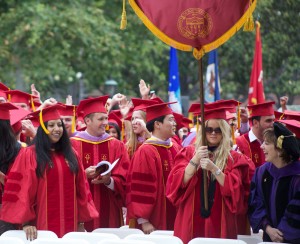Amanpour advises grads to use talents
Nearly 14,000 graduates were honored Friday as USC marked its 129th annual commencement ceremony with a keynote address from award-winning journalist Christiane Amanpour.
Amanpour is the third female speaker since 1983.
In her speech, she urged the new alumni to face their future with courage.

Keynote · Christiane Amanpour, a correspondent for ABC News, delivered the commencement address to the class of 2012 and encouraged the nearly 14,000 graduates to pursue careers that they are passionate about. - Ralf Cheung | Daily Trojan
“Times are tough; I know the economy and the job market [don’t] look fantastic, but you … are the best equipped to come into this environment right now,” Amanpour said. “[God] has given all of us — all of you — exceptional talents, and what counts is what you do with them.”
Amanpour encouraged students to find vocations that they could be passionate about.
“Find something that sets you on fire,” she said. “But I hope that you don’t feel the need to hurry too much on the road. Don’t be too impatient. Don’t feel entitled. Don’t feel that the world owes you or that you have to be at the top of your profession a week after leaving graduate school or a week after leaving your university.”
Chase Blood, who graduated with a master’s degree in building science, said Amanpour’s address was reassuring.
“Her speech was full of things that you can stamp on your heart for the rest of your life,” Blood said. “It was definitely encouraging to hear that you don’t always have to work for the big company; you don’t always have to do the same things our parents did to be successful in your career.”
But not all students were satisfied with Amanpour’s speech.
David Crary, who graduated with a bachelor’s degree in applied and computational mathematics, said he thought her message was underwhelming.
“Her speech was uninspired and disappointing, and she offered poor advice throughout,” Crary said. “She said you shouldn’t worry about being the best, which I feel conveys mediocrity.”
USC President C. L. Max Nikias conferred honorary degrees to USC’s Nisei alumni, first generation Japanese-American students who were forced to abandon their studies during the internment of Japanese nationals and American citizens of Japanese descent in the 1940s.
“The entire university community feels privileged to honor you [Nisei alumni] for your accomplishments,” Nikias said.
USC also recognized seven other honorary degree recipients for their accomplishments, including philanthropic leader Julie Mork; CEO of Energy Corp. of America and USC Trustee John Mork; entrepreneur Armas C. “Mike” Markkula; pharmaceuticals scientist Victoria Hale; international humanitarian Dana Dornsife; USC Trustee David Dornsife; and Canadian Sen. Lt. Gen. Roméo Dallaire.
The university acknowledged three students for their work: salutatorians Sonam Kapadia, who majored in biological sciences and health promotion and disease prevention studies, and Ryan Hill, who majored in biological sciences and kinesiology, and valedictorian Genevieve Hoffman, who majored in economics and international relations. Hoffman asked the graduates to use their knowledge as a means of bettering the world.
“Our education at USC has given us the skills to be important and positive contributors,” Hoffman said.
Austin Byron contributed to this report.


“Amanpour is the third female speaker since 1983.”
I’m sorry but for a country with roughly half the population is female…that’s pretty sad.
Get a life you old people! No ones cares about your history.
George, you too will be old someday…if you live long enough.
Congrsats! to all recent graduates.
I’m in my forties and I wrote a book on the subject. The State of Texas, one of the three largest states has just required German American internment be taught in k12. Latinos are starting to take an interest because some of those Germans were married to Spanish women. There is a Latino side of the internment and it is tied inexorably to the Germans.
Boring! Move on Bob, no one cares!
Now you know about it. On to the next person!
Let’s not forget the Japanese, German and Italian Immigrants who were not interned. Remember, Japanese who lived in the interior were not sent to camps as a matter of course. All three groups were required to live under restrictions that are comparable to registered sex offenders today. Curfews, FBI approval required for every job, every 14 year old immigrant and up required to be issued special id labeling them as Enemy Alien.
Let’s also not forget the Japanese Americans who were given scholarships from the camps to attend universities and it goes on
Mediocrity is accepting an honorary degree for being Nisei. None of we German internees were granted “honorary degrees” we had to earn them after gaining release in 1947 &48. We also did not receive an apology nor the $20,000 that each Japanese received. Unknown too, is that 6,000 Nisei renownced their US born citizenship, received the same rewards stated, whereas not a single GermanAmerican renownced his/her US born citizenship.
The continued xenophobic hatred of anything German since 1914 deprives all of the rich heritage that this ethnc group can provide.
I was interned in Crystal City Texas where only half the inmates were Japanese.And I was there 2 years after they left, being 17 going in and 22 when leaving a free man.
Too bad, another opportunity missed to let the world know that German Americans and Italian Americans were also interned in the U.S. during WWII. And to let the world know that they have not received $20,000, an apology, and a host of other awards and recognition..not even for their service in the armed forces of the United States.
One the truth will be known!